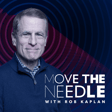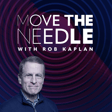
Marcina Hale and Steve Apkon
Today on Move The Needle, Rob speaks with Steven Apkon and Marcina Hale. They are the founders of Reconsider, and on they're on the cutting edge of transforming how we think about mental health in America.
Stephen Apkon is an award-winning filmmaker, and social entrepreneur. He is the Founder and former Executive Director of the Jacob Burns Film Center, a non-profit film and education center located in Pleasantville, NY. Stephen is the Director and Producer of Disturbing the Peace. He is also an Executive Producer of Fantastic Fungi, Planetary, Backyard Wilderness and a Producer of I’m Carolyn Parker, Enlistment Days, and Presenting Princess Shaw. He has also directed Stories of Transformation, which is a series of short films documenting the healing potential of psychedelic medicines.
He is the author of The Age of the Image: Redefining Literacy in a World of Screens, published by Farrar, Straus & Giroux – foreword by Martin Scorsese.
Stephen lives in the Hudson Valley with his partner Marcina, their dog Osa, and the flora, fauna and fungi they share this corner of the planet with.
Marcina Hale LMFT grew up in Ashtabula Ohio, an adventurous tomboy who loved to climb trees, bike, swim, play sports and ponder life. She studied psychology at Ohio University, Media at Long Island University and Systems Therapy (Marriage and Family) at Fairfield University. She is enamored with the mystery of life and loves to play with what is possible.
Marcina Hale LMFT is a therapist and filmmaker who is trained in many modalities from different traditions and appreciates the collective wisdom of cultures. She is a License Marriage and Family therapist certified by CIIS, in Psychedelic-Assisted Therapies & Research and MAPS in Facilitation and Education. She is a facilitator of workshops internationally and across the US and has had the honor of co-creating with many amazing people especially the team at Reconsider.
She is an Executive Producer of Fantastic Fungi, Producer of Disturbing the Peace and is a facilitator for Reconsider workshop experiences, which have been given in the U.S. and internationally. Marcina spoke at TEDxKC Women about how to change the world in which we are living. “Who wants out?"
Marcina’s vision is to catalyze the creation of experiences that evoke thought and conversations that both challenge and inspire new ways of relating to ourselves and to life itself.
#movetheneedlewithrobkaplan #movetheneedle #marcinahale #steveapkon #mentalhealth #reconsidermentalhealth #entrepreneurs #founders #filmmaker #therapy #mentalhealtheducation #author #psychedelic #socialentrepreneur

